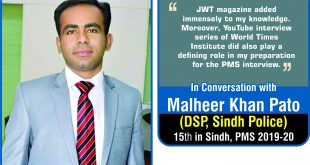Munir Ahmad Badini, ‘Pride of Performance, DMG, 8th Common, Secretary Environment & Sports, Government of Balochistan
Munir Ahmad Badini is one of the senior Baloch officers of the National Civil Service. He joined the Civil Service as a DMG officer in 1980 and spent most of his service in Balochistan. He served on key positions in the government of Balochistan. He was Personal Secretary to the Governor of Balochistan and also served as Deputy Secretary to the Chief Minister as well as to the Chief Secretary Balochistan.
Moreover, he also worked as Secretary Fisheries and he remained Secretary Education for six years. Presently he is serving as Secretary Environment and Sports in the government of Balochistan.
Apart from Civil Service he is also a prominent literary figure of Balochistan; his main area of literary work is short stories and novel. Almost his 30 books have been published in Balochi and his first English novel, Travel to China, is about to publish.
The government of Pakistan has awarded him with the Pride of Performance for his literary services. He also got two national awards from Academy of Letters along with two regional literary awards i.e. Mustawakli Award and Syed Dad Award.
Jahangir’s World Times: Please tell us about yourself, education and achievements?
Munir Ahmad Badini: I belong to district Noshki (Balochistan) and studied at my home town till F.Sc. Later I took admission in Govt Degree College, Quetta, for graduation. I had Sociology, Political Science and Philosophy as major subjects in BA.
After BA, I went to University of the Punjab from where I got masters’ degree in Philosophy. Soon after doing masters I was appointed lecturer of philosophy. Meanwhile, I appeared in the CSS exam and topped the province and secured 15th position in all Pakistan merit. So this is how I joined the civil service as DMG officer on December 15, 1980.
JWT: Did you join civil service by choice or destiny brought you in this profession?
MAB: Well, frankly speaking, I did not want to become a civil servant but destiny brought me to this profession. Actually, after masters I had good knowledge about the subjects of my interest e.g. political science, philosophy and sociology, etc. Moreover, I also knew the prevailing trends of the society and students community at that time. So, I appeared in the exam. I would say it was a coincidence not a planned effort.
JWT: As you know Pakistan is facing severe crisis of governance which is worse in Balochistan. What are the causes of this crisis?
MAB: In my opinion the main cause of this crisis in Balochistan is that we are lacking in human resource development. In fact, we do not have capable people for the suitable jobs and the fact is that our universities and other institutions are not producing required human resource potential.
The society in which we are living, there are a number of political, social and administrative problems. In order to solve these problems, we have to develop our human resource potential.
JWT: How do you foresee the future of sports in Balochistan owing to the poor law and order situation in the province?
MAB: In my opinion the future of sports in Balochistan is always bright in spite of the poor law and order situation in the province. In fact, we did continue our activities in very bad days. I do agree to the extent that we could not reach at certain places but our sub-offices and sports associations do exist in all the districts of Balochistan.
Actually, we have developed our Annual Sports Calendar and we follow it strictly and that is why we continue our activities according to our plans. Recently, I have attended a meeting in Islamabad which was chaired by Prime Minister Yousuf Raza Gilani and it was decided that sports and education departments will coordinate in order to conduct sports activities across the country.
Furthermore, as a major event we are going to hold ‘4th Provincial Games’ in Oct2011, earlier we also had friendship games with Sindh. We went there and their teams also came to Quetta. Similarly, we also participated in ‘National Games’ as well as in ‘Provincial Games’ held at Peshawar. Thus, I would say sports activities will continue, no matter what are the circumstances.
JWT: Quetta is Comes in among the most ‘Polluted Cities’ of the world. It shows ‘Environmental Laws’ are not practiced. What do you think?
MAB: Actually, Quetta is too much populated and still its population is also increasing day by day. So over population and enormous traffic is the major cause of pollution.
Now as far as the ‘Environmental Laws’ are concerned I would say it is the beginning of an end. Earlier, when we were students there was not any kind of awareness or concern about environmental issues like air pollution among the people.
On the contrary, today we can see that people are very much aware of the problems and media is also playing an active role in this. We have made special laws. we have an ‘Environmental Protection Act’ and also an environmental tribunals headed by a judge of the High Court, to bring an end to environmental pollution.
JWT: What steps are being taken by your department for the protection of ‘Natural Environment’?
MAB: Well, for the protection of ‘Natural Environment’ we have made a mechanism i.e. construction of mega projects and small schemes are required to come up to the standards set by Environmental Protection Agency (EPA).
In fact, we have two important terminologies in our day to day businesslike EIA (Environmental Impact Assessment) and IEA (Initial Environmental Assessment).
EIA is used at higher level especially for industrial sector while IEA is done by our department.
Hence, these are some protocols or one can say the initiatives which we have taken for the protection of ‘Natural Environment’ and we remained successful as far as protection of environment is concerned in Balochistan.
‘When I was Secretary Education, I also devised an academic curriculum in order to create basic understanding about protection of ‘Natural Environment’ among the students.’ he added.
JWT: Now after a decade ‘Commissioner System’ has again been restored in Balochistan. Will this system bring any pleasant change in the ‘Civic Life’ of Balochistan?
MAB: Actually, our ‘Civil Service’ or ‘Public Service’ has lost its lesson of serving the people because for me it was; a place of learning, a place of work and a place of delivering ‘good’ to the people or society. However, on the contrary it is not delivering anything ‘good’ neither to the people nor to the society or country.
In addition, I would say our ‘Civil Service’ or ‘Civil Bureaucracy’ is part of our ‘Political System’ which is also not delivering. In fact, ‘Political System’ is a system which reflects the collective will of the people living in a country or state, but this is not so in our case.
Similarly, when a Political System is not viable then how can we expect anything good from the ‘Civil Service’ which itself is part of it. Therefor, I cannot say with confidence whether the system restored is likely to bring any change in the lives of the ordinary people or not.
In addition, in my vision for the improvement in our ‘Civic Life’ we have to revisit our ‘Political System’ instead of relying upon ‘Commissioner System’. Fact of the matter is that our ‘Civil Service’ has undergone through many stages and its role has been distorted. My personal experience is also traumatic. ‘I hope that young officers will join the service with a realistic approach’ he added.
JWT: You also had been ‘Secretary Education’ department of Balochistan government so, how do you see the future of education in the present circumstances of Balochistan?
MAB: Unfortunately, the status of education in Balochistan has been neglected in the past and it will be neglected in the future too. The only reason of this negligence is that ‘education’ has never been a priority and same is the case today.
In fact, the ruling elite in third world countries is not interested in educating its people because of its vested interests. Education brings awareness and freedom with it. The educated masses would ultimately change the very fabric of the society, much to the disadvantage of the ruling elite. So this is not acceptable to them.
Future of education is not bright in Balochistan because of several reasons e.g. Tribalism, lack of infrastructure, dispersed population, lack of funds etc. Thus, in this scenario we cannot expect ‘quality education’ in the province.
JWT: Any Message
MAB: My message is that civil servants should change their mindsets by becoming highly responsive to the needs of the people. They should not succumb to pressure exerted by their political bosses. Forgetting their personal benefits, they should leave no stone unturned in upholding merit. The reason being that a civil servant, compared to his political bosses, stays longer in public domain.
They should say less (Yeses) and more (noes) wherever ‘Public Interest’ is concerned because ‘Civil Servant’ is always a ‘Public Servant’.
 Jahangir's World Times First Comprehensive Magazine for students/teachers of competitive exams and general readers as well.
Jahangir's World Times First Comprehensive Magazine for students/teachers of competitive exams and general readers as well.


